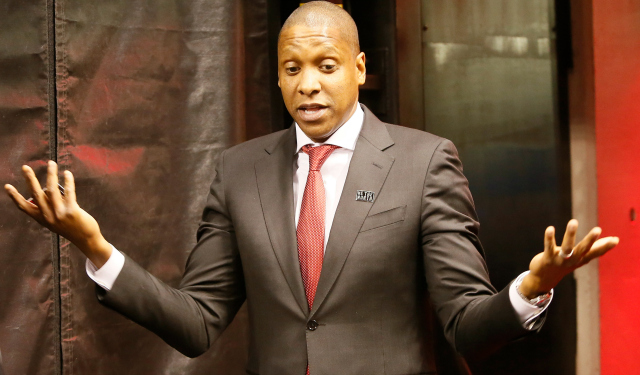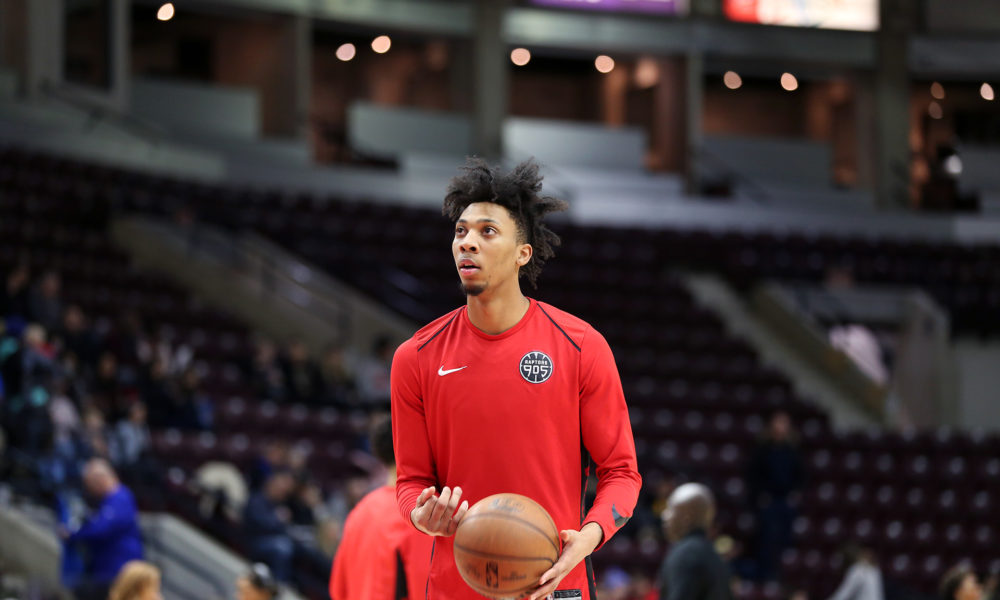Here’s a question for you: if you believe that the Raptors must make a move before tomorrow’s trade deadline, what should they be improving? It’s all well and good to believe that they need to keep pace with the in-season moves made by the Philadelphia 76ers and Milwaukee Bucks as they all jockey for a spot in the NBA Finals, but it’s less certain what they should be targeting, or how they intend to improve. Unlike in years past, where securing Serge Ibaka to shore up a massive hole at power forward was an easy connection to make, the Raptors seem almost too well-composed to make a needle-moving trade in the next 24 hours. In another way, of course, they seem too fragile to not at least try.
Here’s how it breaks down: the Raptors starting lineup looks strong. They have All-Stars at point guard and small forward, borderline All-Stars at power forward and centre, and a terrific low-maintenance glue guy at shooting guard. There is no spot in that five that suggests a meaningful upgrade is realistic without the Raptors pulling off the impossible and landing Anthony Davis.
The bench has looked rocky at times this year, but in the postseason you extend the minutes of the starters and trim the rotation to only your most effective guys. So, let’s say that means that Jonas Valanciunas, Fred VanVleet, and Normal Powell get the lions share of bench minutes, with spot minutes available to Delon Wright and OG Anunoby on occasion. Of those nine players listed, where to you think a trade makes a meaningful difference to their makeup?
For instance, Jeremy Lin has been a name thrown out there to help shore up the offensive stability of the second unit, but do you really trust that Lin is going to be meaningfully better than VanVleet? Yes, Lin’s a slightly better playmaker, but he’s also a less rugged defender, he shoots the three worse, and he’s not as good a rebounder as VanVleet. Maybe you take the playmaking over what VanVleet (or Wright) brings to the table, but what is that actually buying you? Since Normal Powell is at his best creating off of the dribble, what you’re really buying is someone that can throw better entry passes and run the pick-and-roll better with Valanciunas in the minutes that Valanciunas doesn’t share with Kyle Lowry. Now, that’s not nothing, as both VanVleet and Wright make scant intentional use of Valanciunas as a scorer when they share the floor, but I don’t know if the oddsmakers are taking much notice of that kind of nip-and-tuck around the fringes.
Let’s focus less on specific players, then, and instead shift our attention to functional areas of want, like three-point shooting or defensive rebounding.
Three-point shooting has definitely been a thorn in the side of the Raptors this season. They rank 22nd in the league on the season and the eye test has shown how many droughts have been caused by great setups for open threes that have been clanked again and again and again. The thing is, since January 1 the Raptors are 16th in the league in distance shooting at 35.5%, and have been ninth over the last two weeks. In other words, they are actually trending up as a three-point shooting team as currently constructed, somewhat contradicting the notion that this is a dire problem in Raptor-land. Nurse has begun stabilizing his rotations and it’s been paying off in more consistent and reliable play.
Further to that point, assuming the starters are set (and there are two strong three-point shooters already in that five with Green and Leonard, and one theoretically great one in Lowry), and that Valanciunas is likely locked-in as the backup centre moving forward, where are you looking to juice those three-point numbers? VanVleet already shoots nearly 37% from three, and Powell shoots 38%, where are you carving out enough minutes for a significantly better three-point shooter in this rotation? Even if the Raptors manage to snag Wes Matthews off of the buyout market, you’re looking at another guy that shoots in the 38% range.
When it comes to defensive rebounding, you’re mostly talking about the big-man positions. Without a Davis-level trade, Siakam isn’t going anywhere, nor is the team looking to trim his minutes. Valanciunas is one of the league’s best rebounders, so either trading him or sacrificing his minutes for the sake of rebounding feels like a wash. Serge Ibaka is not a strong defensive rebounder (he’s in the bottom half of the league’s centres in defensive rebound rate), but his rebounding has been consistently better in recent weeks, and be brings so many other positives right now it doesn’t appear like his role is in any danger of being thinned. So that leaves, what, Anunoby’s 20 minutes per game to address the rebounding?
The point is, making small improvements around the edges of the roster feels a little like making a move for the sake of making a move. Sure, the Raptors could look to deal C.J. Miles to get out from under his salary since he doesn’t factor into their regular rotation anymore, or try and cash in on Wright if they can find someone that covets a 26-year-old restricted-free-agent-to-be, but does anyone feel more confident in the Raptors’ ability to get to the Finals after moves like that than they are today?
Which brings us to why you are probably hearing more about the Raptors sniffing around Davis and Marc Gasol-Mike Conley than you hear about them sniffing around Lin or Niko Mirotic, because the only way a trade meaningfully improves the Raptors is if it’s a big one. One that risks upsetting the apple cart, destroying what chemistry exists, because if you are going to go for it then you go for it or just leave well enough alone. The thinking in that case is similar to what Philadelphia has been dealing with all season: if the talent level is meaningfully raised, then you deal with the chemistry issues as best you can, but you don’t sweat them on the way to completing a trade. Boston has actually been dealing with the same issue trying to re-integrate all their previously-injured parts this season, which would put nearly all of the East’s top contenders into the same boat if Toronto swung a roster-reshaping move — everyone, that is, except the East-leading Milwaukee Bucks, the one East contender that has had Toronto’s number all year long.
That’s the game that Masai Ujiri signed up to play, though, when he risked a one-year rental with Kawhi Leonard. If Ujiri doesn’t feel like the roster as constructed is the most all-in he can be on this season, then he’s going to look hard to shake things up meaningfully. The Raptors will be an attractive destination to guys that get bought-out if they want to tweak the fringes of the rotation. The trade deadline is for something big, something impactful. The kind of move that can transform a season as easily as it can destroy it. Those are the stakes for Ujiri over the next several hours, and why he isn’t dabbling in the shallow end of the trading pool. This isn’t about finding the little areas that the Raptors can tweak for the back-third of the season, this is about finding the cannonballs that they can launch at teams this April, May, and June. If they are looking at improving something, it’s that: the overall talent top-line talent level or nothing at all.



